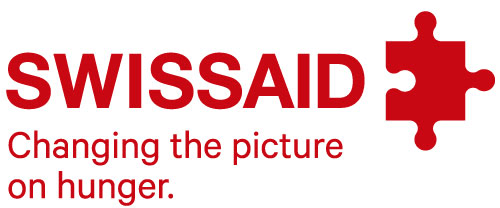Many people in Chad live on the food they produce themselves, e.g. cereals, vegetables or pulses. Not only the people, but also the seeds are at the mercy of extreme heat and irregular rainfall. Oftentimes, their own crops are not enough to feed their families. Millions of people in the country suffer from hunger. Women in particular are under enormous pressure. They are the ones who are mainly responsible for feeding their families.
Like Esther Arada. The 50-year-old farmer lives in rural Djonkor-Guera, is married and the mother of five children – Adoum Deiyé, 21; Jonas Deiyé, 19; Issaka Deiyé, 17; Amos Deiyé, 15; and Noé Deiyé, 7. She and her family make their living from their own agricultural production. Her husband, Deiyé Kattir, is 56 years old.

Salomon Djekorgee Dainyoo/Fairpicture
Climate crisis worsens hunger
The biggest problem for Esther and her family is the unpredictable weather: “When the plants would need the rain the most, it does not come and our harvest withers. Often, our harvest is not enough to feed the whole family,” explains Esther. In addition, food prices continue to rise. Many people can no longer buy food and have to go hungry.
Hunger leads not only to health problems, but also to social problems in families. This causes especially many young people to move to the cities to work, far away from home, leaving the women on their own with household chores, children and work, hoping that the husbands will come back for a better life. “My husband does not work in the city. He is at home with the family and supports me in everyday life,” says Esther, visibly relieved.

Salomon Djekorgee Dainyoo/Fairpicture
Her husband adds, “I support my wife at home to lighten her load.” Eversince, the family has relied on its own cultivation, he says. “The harvest is often not enough. Our children should be able to go to school and do so without suffering from hunger.”
Become part of the solution
Larger harvests thanks to more resistant seeds
SWISSAID supports women farmers like Esther and her family. They receive support like equipment and, in particular, improved local seeds. One of the main products they grow, is peanuts. The new seed for peanuts is more resistant to the low rainfall conditions than the one they were using before.

Salomon Djekorgee Dainyoo/Fairpicture
Thanks to SWISSAID’s help, the farmers can produce more efficiently, have more to eat and more to sell. “The amount of work has decreased and the yields are higher,” says Esther’s husband, Deiyé Kattir. “From two to three bags, we can scale up to more than ten bags,” he continues. This allows parents in Chad to better meet the family’s needs. “We have suffered. But with the support of the improved seed project, we can ensure the family’s survival.”
We are all part of the solution!
Climate crisis, pandemic, hunger: we are convinced that the great challenges of this time can only be tackled together. We are all part of the solution: the smallholder farmer in Chad, the donor in Switzerland, the politician in Bern. SWISSAID puts the various parts together. So that the vision of a world without hunger becomes reality. Piece by piece.

